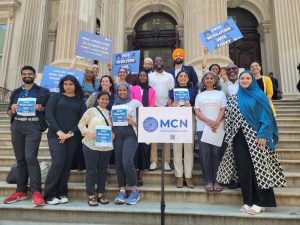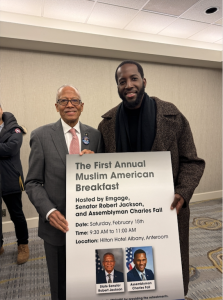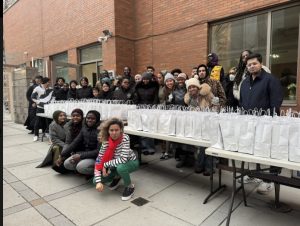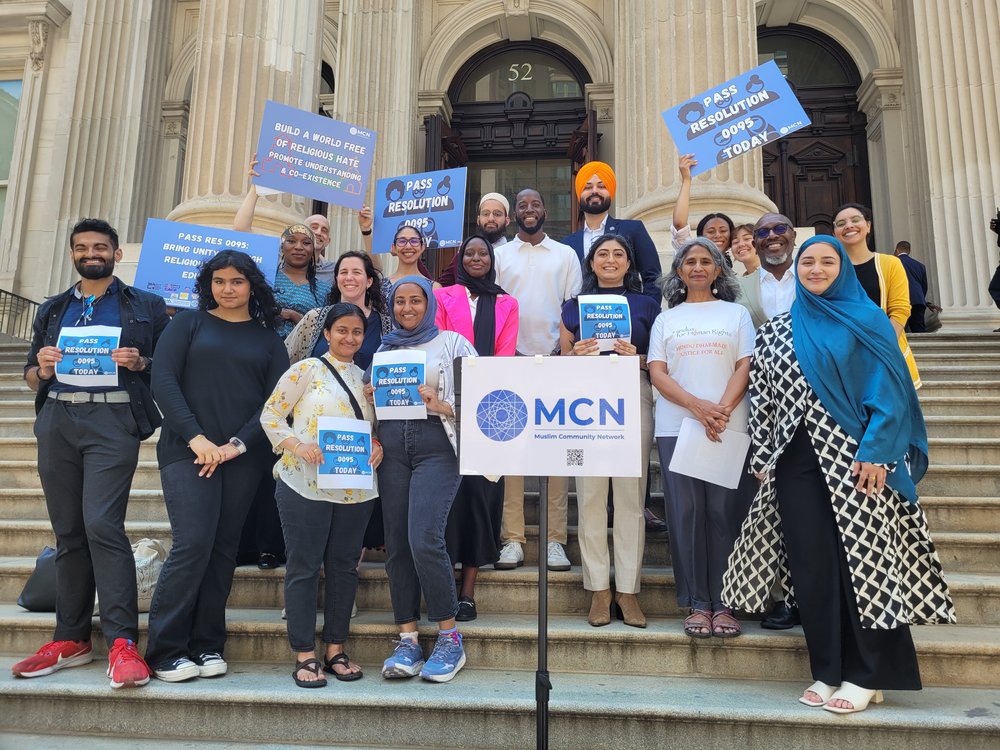By: MOHAMED FARGHALY | mfarghaly@queensledger.com
More than two decades after its founding in the wake of the 9/11 attacks, the
Muslim Community Network (MCN) as an organization continues to serve as a
critical voice in redefining Muslim identity in the United States. Based in New York
City, MCN is dedicated to bridging communities through education, advocacy, and
leadership development.
“The organization is 22 years old. It was started post-9/11, and its mission is to
redefine and shape the narrative around being Muslim in America through three
core pillars: community education, leadership development and advocacy,” said
Husein Yatabarry, executive director of MCN.

From diversity education in New York City schools to food security drives during
Ramadan, MCN’s impact spans neighborhoods and generations. “We fed about 2,000
people during the month of Ramadan,” Yatabarry said, highlighting the group’s
outreach during times of need.
Though headquartered in New York, MCN’s work resonates nationally, especially
amid a political climate that has stirred concerns about Islamophobia and
immigrant rights.
“The immigration issue has been the biggest key,” Yatabarry said. “We often talk
about how the immigration debacle affects Latin communities, but we oftentimes
forget West African communities, South Asian communities, and communities from
North Africa and the Middle East. All those communities happen to be majority
Muslim.”
Yatabarry warned of a resurgence in Islamophobic rhetoric, pointing to “talks of a
second Muslim ban” and the profiling of Muslim students on college campuses.
“Muslims are often a staple for many of the issues,” he said. “Even in media, the first thing pundits usually say [after a violent incident] is, ‘Is it some kind of Islamist
terrorist attack?’”
To counter misinformation and bias, MCN focuses heavily on public education. “We
do outreach to schools to see what schools have large groups of Muslims and offer a
series of workshops on understanding Muslim diversity, deep diving into
Islamophobia and how to connect with Muslim students and families,” Yatabarry
said. “If students continue to go through the K-12 experience and don’t know
anything about Muslims, they’re often just subject to what they’ve heard in media.”

MCN does not operate as a membership organization. Instead, it builds networks
across mosques, shelters, schools, and government agencies. “We’re more like a
community outreach organization,” Yatabarry explained. “We have partnerships
with different mosques and community groups, and when they need community
workshops — whether it’s financial literacy, Know Your Rights, or hate crime
prevention — they reach out to us.”
Misconceptions about Muslims remain a central challenge. “A lot of it is just about
the violence that people attribute to Muslims as a group, even though it’s a religion
that’s built on peace,” said Yatabarry. He stressed the need to highlight the
contributions of the estimated 750,000 to one million Muslims in New York City,
including the 100,000 Muslim students in the public education system and roughly
10% of the city’s healthcare workforce.
He also emphasized the religious and ethnic diversity within the Muslim
community: “It’s not just an Arab religion. It’s a worldwide religion that a quarter of
the whole globe practices… You have this cultural diversity within the religion
itself.”

For Yatabarry, MCN’s mission is deeply personal. “I grew up in the Bronx. I was a
child of the public education system in New York City,” he said. “There was a time
period where you almost kind of wanted to hide your identity and bottle up in a
shell… Having a religion that’s the minority in any school that you go to, where it’s
not talked about — it’s hard to really feel included.”
In an era where diversity, equity, and inclusion initiatives are facing increasing
political backlash, Yatabarry sees MCN as a necessary counterweight. “Nonprofits
like ours are to be a counterbalance. Like, no — you have to lean in and be more
inclusive in a city like New York City, where you have a city that’s built on
immigrants.”
One of his most memorable moments with MCN came during a roundtable event last
summer. “We held a stakeholders roundtable with nonprofits from all over the city…
specifically discussing the topic of hate in all fashions — Islamophobia, anti-
Semitism, anti-Black violence, anti-immigrant violence — and how we could work
together as a coalition,” he said. “That social cohesion piece… it’s going to connect us
more, and we’re going to be stronger as a New York community for it.”
When asked how the public — Muslim and non-Muslim alike — can support MCN’s
work, Yatabarry’s message was clear: stay informed and think critically. “If you look
at a tweet or a TikTok video saying something harmful and disparaging and you take
that on face value without doing the proper research, then you may continue to
spread that hateful message,” he said. “You should fact-check it… That just goes for
anyone — elected officials, nonprofits, the government.”
As MCN looks ahead, its mission remains rooted in a belief that inclusion,
understanding, and education are the keys to a stronger, more just society.



